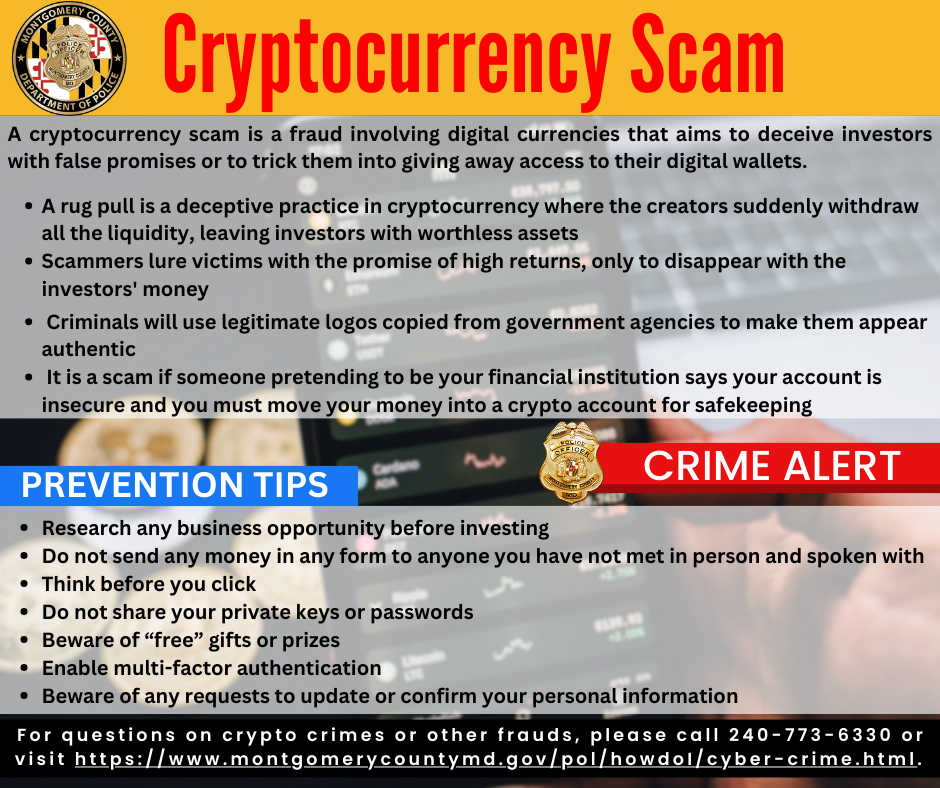Cryptocurrency Scams
A cryptocurrency scam is a fraud involving digital currencies that aims to deceive investors with false promises or to trick them into giving away access to their digital wallets.  A rug pull is a deceptive practice in cryptocurrency where the creators suddenly withdraw all the liquidity, leaving investors with worthless assets. Scammers lure victims with the promise of high returns, only to disappear with the investors' money. Criminals will use legitimate logos copied from government agencies to make them appear authentic.
A rug pull is a deceptive practice in cryptocurrency where the creators suddenly withdraw all the liquidity, leaving investors with worthless assets. Scammers lure victims with the promise of high returns, only to disappear with the investors' money. Criminals will use legitimate logos copied from government agencies to make them appear authentic.
Scammers can trick victims into sending cryptocurrency, resulting in irreversible financial losses. Some scams involve stealing personal information, leading to identity theft and further fraud. Scammers use malware and phishing techniques to compromise wallets and access funds. Ponzi schemes and fake investment opportunities promise high returns but result in total loss. The lack of regulatory oversight of cryptocurrency makes it challenging to recover stolen funds.
Signs of a Cryptocurrency Scam
- Research and Due Diligence: Thoroughly research any cryptocurrency project, exchange, or investment opportunity before participating. Do not rely solely on materials provided by the organization.
- Beware of Unsolicited Offers: Be cautious of unsolicited messages or emails offering cryptocurrency investments or giveaways.
- Check Website URLs: Verify website URLs for accuracy, as scammers often create convincing fake websites.
- Use Trusted Platforms: Only use reputable cryptocurrency exchanges and wallets with a track record of security.
- Analyze Investment Offers: Be skeptical of investment opportunities that promise guaranteed high returns; if it sounds too good to be true, it probably is.
Prevention Tips
- Educate Yourself: Learn about common cryptocurrency scams and stay updated on new tactics.
- Ignore Pressure: Don't succumb to pressure or urgency in cryptocurrency deals; scammers often use these tactics.
- Secure Wallets: Use hardware and software wallets from reputable sources with strong security features.
- Enable Two-Factor Authentication (2FA): Add an extra layer of security to your accounts with 2FA. See Cyber Crime Prevention for more information.
- Avoid Public Wi-Fi: Don't access your cryptocurrency accounts or transact on public Wi-Fi networks.
Recovering from the scam
- Report the Attack: Report the phishing incident to your organization's IT or security team and the proper authorities.
- Alert Cryptocurrency Exchanges: Inform cryptocurrency exchanges involved in the scam to prevent further transactions.
- Trace Transactions: Use blockchain explorers to trace the movement of stolen funds.
- Share Information: Share details of the scam on cryptocurrency forums and social media to warn others.
- Implement Security Measures: Strengthen security measures to prevent future attacks, such as enhancing email filtering and employee training. See Cyber Crime Prevention
- Regularly Monitor Accounts: Continuously monitor accounts and systems for suspicious activity.
References:
- Bartoletti, M., Lande, S., Loddo, A., Pompianu, L., & Serusi, S. (2021, January 1). Cryptocurrency Scams: Analysis and Perspectives. Cryptocurrency Scams: Analysis and Perspectives | IEEE Journals & Magazine | IEEE Xplore. Retrieved from https://scite.ai/reports/10.1109/access.2021.3123894.
- Federal Bureau of Investigation. (2025 February 13). Operation Level-Up: How the FBI Is Saving Victims from Cryptocurrency Investment Fraud. Retrieved from https://www.fbi.gov/news/stories/operation-level-up-how-the-fbi-is-saving-victims-from-cryptocurrency-investment-fraud.
- Federal Reserve Board, Office of Inspector General. (2024). Material Loss Review of Heartland Tri-State Bank. Retrieved from https://oig.federalreserve.gov/reports/board-material-loss-review-heartland-tri-state-bank-feb2024.pdf
- Federal Trade Commission. (2020, July 16). Avoiding a cryptocurrency scam. Retrieved from https://consumer.ftc.gov/consumer-alerts/2020/07/avoiding-cryptocurrency-scam
- Federal Trade Commission. (2023). Cryptocurrency Scams https://www.youtube.com/watch?v=aCco5KDRPJE
- Federal Trade Commission. (2023). Estafas de criptomonedas https://www.youtube.com/watch?v=qOfh5EEzE2A
- Federal Trade Commission. (2021, May 17). Spotting cryptocurrency investment scams. Retrieved from https://consumer.ftc.gov/consumer-alerts/2021/05/spotting-cryptocurrency-investment-scams
- Federal Trade Commission. (2022, June 8). Cryptocurrency scams and the LGBTQ+ community. Retrieved from https://consumer.ftc.gov/consumer-alerts/2022/06/cryptocurrency-scams-and-lgbtq-community
- Federal Trade Commission. (2020, June 26). Cryptocurrency blackmail scam alert. Retrieved from https://consumer.ftc.gov/consumer-alerts/2020/06/cryptocurrency-blackmail-scam-alert
- Federal Trade Commission. (2022, May 19). What To Know About Cryptocurrency and Scams. Retrieved from https://consumer.ftc.gov/articles/what-know-about-cryptocurrency-and-scams
- Federal Trade Commission. (2023, July 13). Cryptocurrency deposits with no returns. Retrieved from https://consumer.ftc.gov/consumer-alerts/2023/07/cryptocurrency-deposits-no-returns
- Federal Trade Commission. (2018, February). Know the Risks Before You Invest in Cryptocurrencies. Retrieved from https://consumer.ftc.gov/consumer-alerts/2018/02/know-risks-you-invest-cryptocurrencies
- Financial Crimes Enforcement Network (FinCEN) (2023, September 8). FIN-2023-AlertO0S: FinCEN Alert on Prevalent Virtual Currency Investment Scam Commonly Known as "Pig Butchering." https://www.fincen.gov/news/news-releases/fincen-issues-alert-prevalent-virtual-currency-investment-scam-commonly-known
- Trozze, A., Kamps, J., Akartuna, E.A. et al. Cryptocurrencies and future financial crime. CrimeSci 11, 1 (2022). https://doi.org/10.1186/s40163-021-00163-8
- Yaffe-Bellany, D. (April 22, 2023). The Crypto Detectives Are Cleaning Up. NYTimes. Retrieved from https://www.nytimes.com/2023/04/22/business/crypto-blockchain-tracking-chainalysis.html
Cryptocurrency Scam Flyer
Right click on the image below and download it to distribute as a hardcopy flyer.


